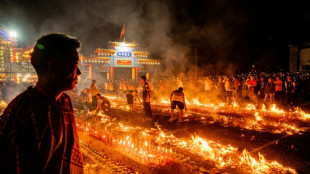Landslide wipes out Sudan village, killing hundreds
Sudanese authorities, the United Nations and aid groups scrambled Tuesday to respond to a devastating landslide in Sudan's Darfur region that buried an entire mountain village, killing hundreds of people.
Heavy rain triggered the disaster on Sunday, flattening the village of Tarasin in the remote Jebel Marra range, the rebel Sudan Liberation Movement/Army (SLM) faction which controls the area said.
UN humanitarian coordinator in Sudan Luca Renda said in a statement that "the United Nations and our humanitarian partners are mobilising to provide support to the affected population."
Citing sources on the ground, Renda said the death toll from the landslide was believed to be between 300 and 1,000.
UN spokesperson Stephane Dujarric said the full scale of the disaster remains unclear "as the impacted area is extremely hard to reach".
The SLM faction, led by Abdulwahid al-Nur, had earlier estimated the death toll at more than 1,000 people, with only one survivor.
That survivor, according to his uncle Fath al-Rahman Ali Abdelnour, suffered multiple fractures to both legs and a serious head injury.
"He is in a coma and unable to speak," Abdelnour told AFP from the Ugandan capital of Kampala where he lives.
Abdelnour, whose father had founded Tarasin in the 1980s, said that in addition to longtime residents, the village has also hosted around 450 people displaced by Sudan's ongoing war between the army and rival paramilitaries.
The war, which began in April 2023, has ravaged Sudan, killing tens of thousands of people and driving millions from their homes, according to UN figures.
- 'Masses of mud' -
SLM leader Nur told AFP via a messaging app that "masses of mud fell onto the village."
"Our humanitarian teams and local residents are trying to retrieve the bodies, but the scale of the disaster is far greater than the resources available to us," he said.
Images the SLM published on its website appeared to show vast swathes of the mountainside sheared away, with the village below buried under thick mud and uprooted trees.
The African Union called on "all Sudanese stakeholders to silence the guns and unite in facilitating the swift and effective delivery of emergency humanitarian assistance".
On Monday, both the army-aligned government and the paramilitary Rapid Support Forces (RSF) called for humanitarian mobilisation in response to the disaster, but neither mentioned any potential ceasefire.
The SLM controls parts of the Jebel Marra range and has mostly stayed out of the war.
Hundreds of thousands of people have fled into SLM-held territory to escape the violence.
Jebel Marra is a rugged volcanic range stretching about 160 kilometres (100 miles) southwest from North Darfur's besieged state capital El-Fasher, which the RSF is pushing to capture after besieging it for more than a year.
The area, known for citrus production, is prone to landslides, particularly during the rainy season which peaks in August. A 2018 landslide in nearby Toukoli killed at least 20 people.
- 'Painful disaster' -
The Transitional Sovereignty Council of army chief Abdel Fattah al-Burhan pledged to mobilise all available resources to support those affected by what it described as a "painful disaster".
The paramilitary-backed government based in South Darfur state capital Nyala has issued a statement announcing aid efforts.
Mohamed Hassan al-Taayshi, the prime minister recently sworn in by RSF commander Mohamed Hamdan Daglo expressed deep sorrow, saying he had spoken directly with SLM leader Nur to assess needs on the ground.
"The lives and safety of Sudanese citizens are above any political or military considerations," Taayshi said.
Much of Darfur -- including the area where the landslide occurred -- remains inaccessible to international aid organisations due to ongoing fighting, severely limiting the delivery of emergency relief.
The disaster also comes during Sudan's rainy season, which often renders mountain roads impassable.
In Sudan's main war zones like Darfur, infrastructure was already fragile after more than two years of fighting.
On Tuesday the army-aligned government, based in Port Sudan on the Rea Sea, announced that it would extend through the end of the year a decision to open the Adre border crossing with Chad -- a critical lifeline for humanitarian aid.
The move "coincides with the disaster in Tarasin", the Sudanese foreign ministry said in a statement.
Q.al-Buainain--BT




